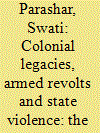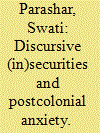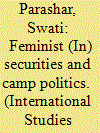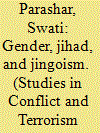|
|
|
Sort Order |
|
|
|
Items / Page
|
|
|
|
|
|
|
| Srl | Item |
| 1 |
ID:
165066


|
|
|
|
|
| Summary/Abstract |
This article examines the connected histories of armed tribal and peasant revolts in colonial and postcolonial India with reference to the ongoing Maoist conflict in rural and tribal areas of central and eastern India. The article makes two interrelated arguments about the violent continuities that endure from colonial to postcolonial contexts: (1) the nation-state system, in its efforts to establish control and influence, creates a hierarchy of citizenship engaging in the hostile policing of marginalised subjects, thereby engendering armed revolts and political violence; (2) the postcolonial state’s response to these armed revolts by marginalised subjects who challenge its sovereignty and monopoly over violence, is equally violent and repressive. Most significantly, the state’s response is legitimised in the same colonial idioms and justifications that mark epistemic and physical violence against the third world.
|
|
|
|
|
|
|
|
|
|
|
|
|
|
|
|
| 2 |
ID:
157926


|
|
|
|
|
| Summary/Abstract |
This article queries the intimate relationship between militarism and the state, which is seen as the by-product of ‘postcolonial anxiety’ (Krishna, 1999) related to the survival of the nation-state in the Third World. This anxiety enables militarism at various levels of governance and state interventions in the everyday lives of the citizenry. The article engages with the historical trajectory of the Indian state to argue that its ‘postcolonial anxiety’ engenders militarism not in the immediate aftermath of independence from colonial rule, as in other postcolonial states, but as an anomaly since the end of the Cold War and the advent of globalization. The Indian state rejected militarism immediately after independence, but subsequently used it sporadically to deal with armed insurgencies in the 1970s and 1980s. The popular endorsement of militarism in India coincides with the globalized world order of the 1990s, the move to democratize ‘security’ in discourse and practice, and the adoption of neoliberal developmentalism to ‘catch up’ with the ‘modern’ trajectory of the European nation-states. I argue that this has led to ‘excessive militarism’ that thrives on the shared consensus between the state and citizens that security is a collective enterprise in which the material and affective labour of militarism must be performed by both sides. Citizens embrace military logics and military ethos, both to contest the state’s violence and to confer legitimacy on the state and secure development benefits. The article concludes that militarism opens up new spaces for understanding the complex statebuilding processes of postcolonial societies, the fraught and textured relationship between the state and citizens, and the constant tensions and negotiations between civilian lives and military culture.
|
|
|
|
|
|
|
|
|
|
|
|
|
|
|
|
| 3 |
ID:
126702


|
|
|
|
|
| Publication |
2013.
|
| Summary/Abstract |
Forum: The State of Feminist Security Studies: Continuing the Conversation. This forum comprises seven pieces conceived in response to the recent Politics & Gender Critical Perspectives section that featured contributions from Carol Cohn, Valerie Hudson, Jennifer Lobasz, Laura Sjoberg, Ann Tickner, Annick Wibben, and Lauren Wilcox (P&G 2011, Vol. 7, Issue 4). Throughout, we refer to this collection as "the CP section."
|
|
|
|
|
|
|
|
|
|
|
|
|
|
|
|
| 4 |
ID:
089478


|
|
|
|
|
| Publication |
2009.
|
| Summary/Abstract |
This paper presents women's militant activities outside the binary framework of 'victimhood' and 'agency' and invokes postmodern feminist international relations analyses to engage with women's material and ideological contribution to militant activities and political violence. Women who support and indulge in both discriminate and indiscriminate violence against institutions of the state and unarmed civilians not only redefine notions of nationalism, gender and religious identity, but also highlight their complex and problematic relationship with feminism. To what extent does participating in militant activities and armed combat provide women with opportunities to transcend conventional gender roles? In other words, do they remain the 'other' within 'the other'? How are militant women influenced by these political movements and how do they influence these movements? What happens when the 'protected' and 'upheld' become the 'protectors' and 'upholders'? How does/should feminist international relations approach these militant women? I attempt to address these questions through a study of women militants and their constructions as gendered political subjects in Kashmir and Sri Lanka.
|
|
|
|
|
|
|
|
|
|
|
|
|
|
|
|
| 5 |
ID:
106590


|
|
|
|
|
| Publication |
2011.
|
| Summary/Abstract |
The Kashmir case is a conundrum in the study of women's roles in religio-political militancy. While traditional social structure and gendered hierarchies have been retained, public spaces have also been available to women to don more political and militant roles. This article looks at the multiple roles of women in the militancy in Kashmir and the discourses around them. Women's participation in the militancy has not found any mention in the nationalist narratives and Kashmiri women struggle to claim their share in the contemporary political discourse. Ambiguities remain about how the male-dominated Kashmiri nationalist and conflict discourse may have influenced inclusions and exclusions. Through a case study based on interviews conducted in Kashmir, this article argues that women's violent activities or their support to the militancy is altogether excluded or maneuvered to preserve existing gender norms and patriarchal traditions. This has dangerous implications as it tends to exclude women's voices in the peace processes.
|
|
|
|
|
|
|
|
|
|
|
|
|
|
|
|
| 6 |
ID:
081850


|
|
|
|
|
| Publication |
New Delhi, Pearson Longman, 2008.
|
| Description |
xiii, 218p.
|
| Standard Number |
9788131704042
|
|
|
|
|
|
|
|
|
|
|
|
Copies: C:1/I:0,R:0,Q:0
Circulation
| Accession# | Call# | Current Location | Status | Policy | Location |
| 053515 | 359.03/PAR 053515 | Main | On Shelf | General | |
|
|
|
|
| 7 |
ID:
168601


|
|
|
|
|
| Summary/Abstract |
This paper reflects upon the role of brokers in facilitating research in conflict zones, which the researcher identifies as ‘native’ areas of research in the Global South. Researchers from the Global South, based in academic and research institutions in Western locations and having received funding from foreign agencies, conduct field research in conflict geographies which they maybe native to, or may have inhabited for long periods of time. Brokers facilitate research in these ‘native’ areas of research, leading to difficult encounters between the researcher, research subjects and brokers themselves. I analyze the intimate and uncomfortable affective encounters between researchers and research brokers from the Global South who share national or cultural identity, language and above all, spatial nativity and familiarity.
|
|
|
|
|
|
|
|
|
|
|
|
|
|
|
|
| 8 |
ID:
067725


|
|
|
|
|
| Publication |
New Delhi, Pearson Education, 2005.
|
| Description |
xiii, 269p.
|
| Standard Number |
8129709988
|
|
|
|
|
|
|
|
|
|
|
|
Copies: C:1/I:0,R:0,Q:0
Circulation
| Accession# | Call# | Current Location | Status | Policy | Location |
| 050696 | 303.6250959/JOH 050696 | Main | On Shelf | General | |
|
|
|
|
| 9 |
ID:
126063


|
|
|
|
|
| Publication |
2013.
|
| Summary/Abstract |
What happens when the 'international' as a distinct social space is approached from the perspective of war rather than war from the perspective of the 'international'? Tarak Barkawi's question (Millennium, 39:3, 2011, 701-706) is best answered by attempts to understand war not as part of inter/intra-state relations but as a socio-cultural, trans-historical institution that impacts on the 'everyday' lives of men, women and children. In this article I argue that war is not a disruption of the 'everyday', an abstraction that has a definite beginning and end, something we enter into and exit. Instead, it can be captured in daily and mundane lived experiences of people and in powerful emotions that constitute 'self', community and the 'other.' Drawing upon my research on wars in South Asia, I particularly reflect on how war shapes the banal and the fervent and how cultural and political narratives of 'war bodies' perform the 'international' in a variety of ways. Most significantly I want to draw attention to how international relations as a scholarly discipline is so deeply engaged with war and yet seems to have an estranged relationship with it.
|
|
|
|
|
|
|
|
|
|
|
|
|
|
|
|
|
|
|
|
|